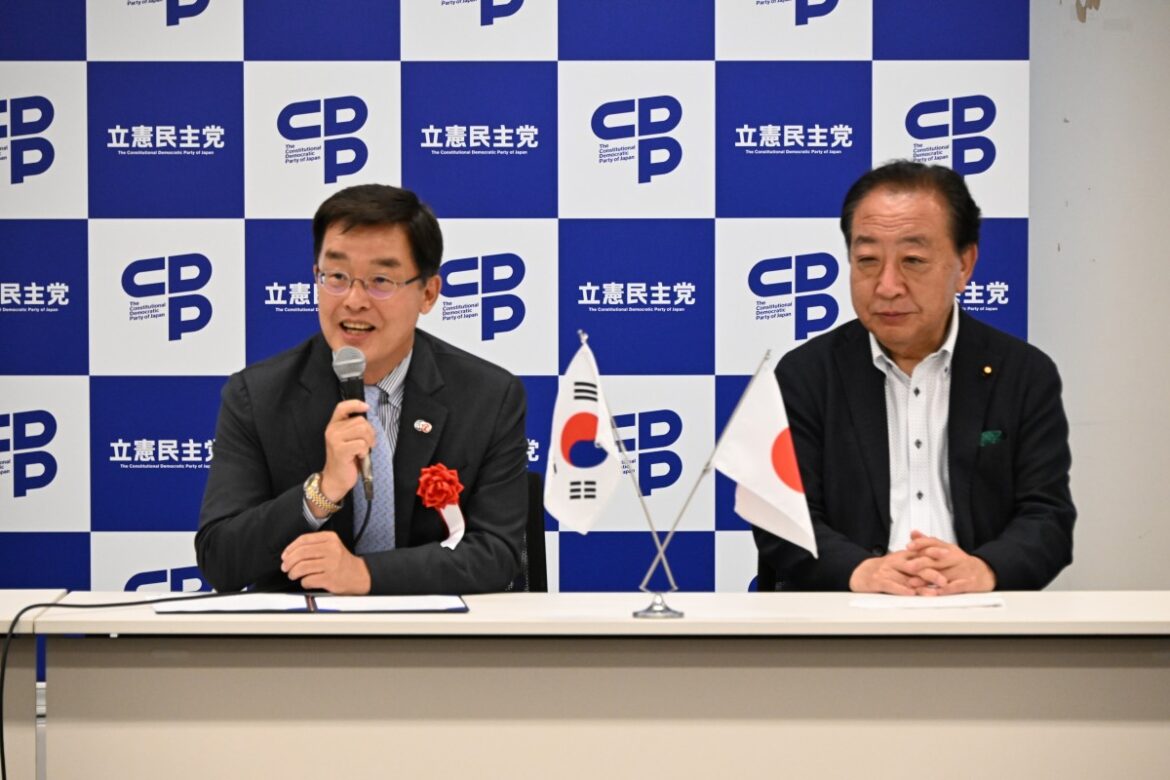On the afternoon of 16 June, the Constitutional Democratic Party held its first meeting of the Party Diplomacy Promotion Headquarters. Attendees included President Yoshihiko Noda, Secretary-General Junya Ogawa, and International Department Director Kentaro Genma, along with numerous other party members. The meeting confirmed the committee’s purpose, structure, operational guidelines, and future activity plans. In the latter half of the meeting, South Korean Ambassador to Japan Park Chol-hee delivered a special lecture titled ‘Japan-South Korea Relations on the 60th Anniversary of Diplomatic Normalization.’
Opening Remarks by President Noda
At the beginning of the meeting, President Noda referred to the Third Conference of States Parties to the Treaty on the Prohibition of Nuclear Weapons, held at the United Nations Headquarters in March this year. He explained that, even though the Japanese government did not even participate as an observer, the party sent Shinji Morimoto of member of the House of Councilors, elected from Hiroshima Prefecture, as its representative, and he was the first Japanese parliamentarian to speak at the conference, appealing to the international community about the reality of the atomic bombing and the current issues. Given the current situation where the Japanese government is not adequately fulfilling its role as a bridge between nuclear-armed and non-nuclear-armed countries, he stated that ‘there was significance in supplementing what the government cannot do through parliamentary diplomacy and party diplomacy.’
Regarding Japan-South Korea relations, he reported that while Prime Minister Ishiba could not realized his visit to South Korea in January, the Constitutional Democratic Party had dispatched Kazuhiko Shigetoku, Chairman of the Policy Research Committee, and others to South Korea to engage in close exchanges of opinions with both the ruling and opposition parties in South Korea. He stated that there was a shared understanding that ‘Japan-South Korea relations must continue to be closely coordinated’ even if changes occur in South Korea’s political landscape, including a change of government, emphasizing the importance of inter-party dialogue and expressing the intention to actively promote party exchanges in the future.
Secretary-General Ogawa Outlines the Party’s Diplomatic Action Plan
Next, Secretary-General Ogawa explained the specific operational policies of the headquarters. It was confirmed that the ‘Next Cabinet/Foreign Affairs Department’ will be responsible for formulating foreign policy, the ‘Foreign Affairs and Security Strategy Project Team’ will be responsible for medium- to long-term strategies, and the ‘International Department’ will be responsible for the practical aspects of party diplomacy, with the Party Diplomacy Promotion Headquarters overseeing all party diplomacy. A wide range of activity plans were presented, including regular dialogue with political parties in countries with which memorandums of understanding have been concluded, overseas dispatch of delegations, exchanges with diplomatic missions in Japan, participation in international political party conferences, recording of oral histories, and strengthening of information dissemination.
Special Lecture by Ambassador Park Cheol-hee
On the occasion of the 60th anniversary of the normalization of diplomatic relations between Japan and South Korea and the inauguration of a new president, a special lecture was given by Park Chol-hee, South Korean Ambassador to Japan. In response to President Noda’s congratulatory message to the new administration, ‘Considering the severe security environment in the Asia-Pacific region, strong cooperation between South Korea, the United States and Japan is essential. In this context, cooperation between South Korea and Japan will serve as the foundation for peace, stability and prosperity in the region,’ the ambassador expressed his full agreement.
Furthermore, the new administration stated its policy to prioritize relations with neighboring countries from the perspective of national interests and practical benefits, while maintaining cooperation between South Korea and the United States, and between South Korea and Japan, based on the South Korea-U.S. alliance.
The ambassador also stated that South Korea and Japan are very close neighbors, both geographically and historically, and share many common issues, emphasizing the importance of stable cooperation between the two countries. He quoted a South Korean proverb, ‘A single sheet of white paper is lighter when held with both hands,’ to appeal for the need for Japan and South Korea to work together to resolve issues. Following the ambassador’s lecture, a reception was held where participating lawmakers had the opportunity to converse with the ambassador and embassy staff.


WACOCA: People, Life, Style.